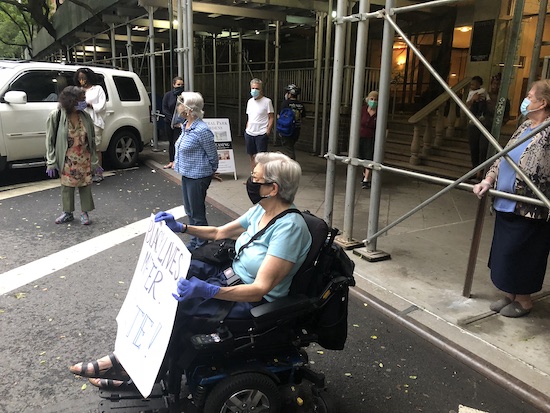
Among the signs at a recent protest was one calling for a repeal of 50-a. Photo by Allison Broder.
By Michael McDowell
The protests against police brutality over the past 10 days in New York City have allowed people to express the raw pain they’re feeling. But they also have concrete goals — and none has been more prominent than the repeal of a law known as Civil Rights Law 50-a.
The law allows police to refuse to turn over police personnel records — which lets them hide misconduct, advocates say.
 Assembly Member Danny O’Donnell (right), who represents portions of the Upper West Side, has been leading the charge to repeal 50-a for several years, but has not been successful. Now his efforts are getting more attention, and the chances are rising that the law will be repealed, or at least reformed.
Assembly Member Danny O’Donnell (right), who represents portions of the Upper West Side, has been leading the charge to repeal 50-a for several years, but has not been successful. Now his efforts are getting more attention, and the chances are rising that the law will be repealed, or at least reformed.
“If we repeal 50-a in New York, the state will no longer have a written law that says police records cannot be looked at,” he said in an interview with the Rag on Friday. “I’m confident that we have the votes to pass it, and could do so as early as next week.”
New York is one of only three states that gives specific protection to police officers’ records, according to the New York City Bar, which called for the repeal of 50-a in 2018. However, while these records are not specifically protected in other states, that does not mean the records are publicly available.
“When you look at the murder in Minneapolis, the murder of Mr. Floyd—he was murdered,” O’Donnell emphasized. “In the days following, everybody knew what the disciplinary history of the person who murdered him was. We only had that information because Minnesota does not have a 50-a like statute,” O’Donnell explained.
“The family of Eric Garner has never learned the information that the family of Mr. Floyd has learned,” O’Donnell said, referring to the 2014 killing of Garner, an unarmed black man who was choked to death in Staten Island by former NYPD officer Daniel Pantaleo.
Garner, a father of six and grandfather of three at the time of his death, was a major inspiration for Black Lives Matter. In footage of his death taken by a passerby, Garner can be heard crying out “I can’t breathe!” eleven times.
A grand jury would decide not to indict Pantaleo, who remained employed by the NYPD until 2019, five years after he killed Eric Garner. Although portions of Pantaleo’s personnel records were leaked in 2017, courts ruled that 50-a did not permit the legal release of these records, and that only the state legislature could fix the law to allow the records to be made public.
“What we have is a bill written in 1976 when the world was a very different place,” O’Donnell explained.
“The original intention was to protect personal information from being disclosed by police officers who may be subject to cross examination in court,” O’Donnell said, adding that the law was never intended to shield police personnel records from the public.
In 2016, Frank Padavan, who was the chief sponsor of the original legislation, confirmed that the sole intention of the statute was to prevent private attorneys from using subpoenas to gain unfettered access to the personnel records of police officers.
“The way it was written has allowed courts to interpret 50-a as a block on the release of any of this information,” O’Donnell said.
“If you don’t repeal it outright, you still have this court history that misinterprets what the intention of the original law was. If 50-a is gone, police records, just like other records, are subject to FOIL,” he continued, referring to New York State Freedom of Information Law. “So if we get rid of 50-a, police officer records would be subject to the same privacy protection that all other state and municipal employees are given under the FOIL law.”
The Police Benevolent Association, a police union, opposes repeal of 50-a, and argues that it would put the lives of police officers in danger of violent retaliative action.
“As an elected official, I would take no action that would endanger the lives of others, and most particularly, endanger the lives of public servants. As a person who lived for a time with a death threat during the marriage equality fight, I understand how frightening that can be,” O’Donnell said.
“But we need more transparency in our government, and the trust between the police and those who are policed has been eroded. This is a step, in my opinion, in the right direction. We don’t need 50-a in order to protect police.”
O’Donnell said he believed Governor Cuomo would sign repeal legislation, and “reform” of 50-a appeared in “Say Their Name” legislation the governor announced earlier today.
However, O’Donnell, clarified, “Cuomo’s support is always qualified.”
The governor has relished the opportunity 50-a repeal presents to position himself to the left of Mayor de Blasio, who has supported reform—but not repeal—of 50-a in the past.
O’Donnell argued that reform would be insufficient, and suggested it would allow municipalities to use decades of court rulings as a justification to continue to shield conduct records from the public.
“I wrote this bill, and I’ve carried it for five plus years. It remains my top priority. I have looked into ways we could do reform without repeal, including the Mayor’s [suggestions], and it has further convinced me that repeal is the right way to go.”
Several weeks before George Floyd’s death in Minneapolis, an NYPD officer, Francisco Garcia, kneeled on Donni Wright’s neck in the East Village. Wright survived, but footage of the incident, which was recorded by passersby, is chilling, and evinces how narrowly New York escaped another tragedy.
Protests continued across New York City on Friday.









50-A must go. Many thanks to Assembly Member O’Donnell in leading this important fight. I encourage everyone to contact legislators and demand that 50A be repealed.
I’m proud and grateful that Daniel O’Donnell is my Assembly person He is on the side of the people on all issues .repeal 50-a
Good cops — and there are many — will have nothing to fear from repeal of 50-a. Except for extraordinary security issues, all functions of government should be transparent to the taxpayers that support them.
Repeal 50-a. Case closed. Thank you Assemblyman O’Donnell for your representation.
“The Police Benevolent Association, a police union, opposes repeal of 50-a, and argues that it would put the lives of police officers in danger of violent retaliative action.”
If police officers treat people with respect, they will not be in danger of violent retaliative action. What we are all witnessing this week is that too too many police become power hungry and have no respect for people’s frustration and anger. Instead they instigate their own violent reactions.
Where we see police speaking with protestors in an attempt to understand and listen, there is no violence. Instead there are hugs and police officers taking a knee and walking with the protestors. We see people coming together.
Repeal 50-a. Case closed.
Kudos to Assembly Member O’Donnell. 50-a should definitely be a part of an overall police reform strategy. Also need to reform the procedures under which police officers who engage in misconduct are investigated and disciplined. As the article notes, it took five years for the officer who killed Eric Garner to be fired. That’s wrong. The power of the PBA must be curtailed.